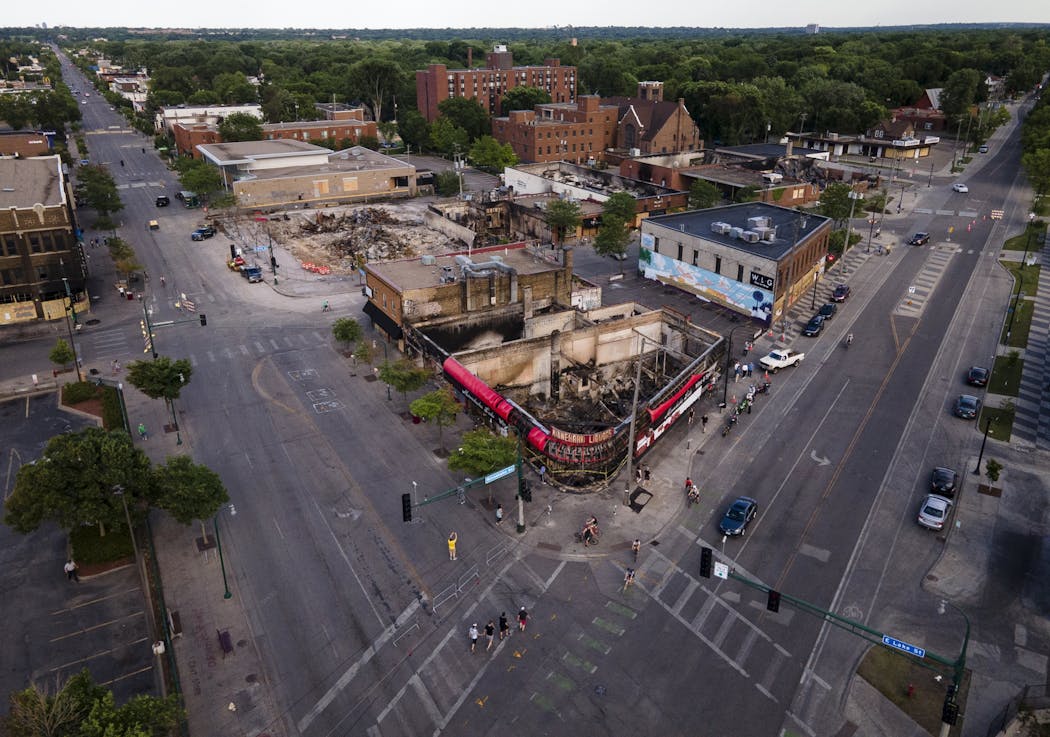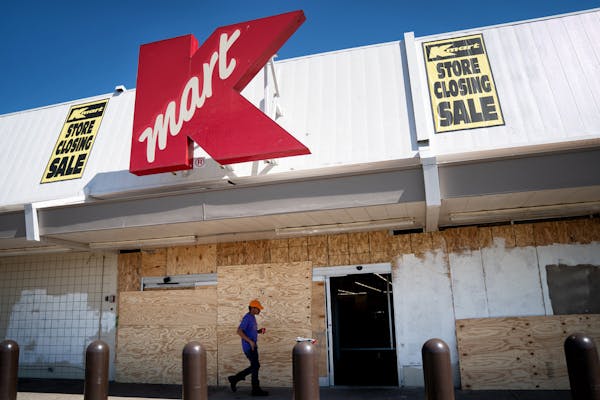It was just after midnight when Ali Barbarawi saw looters break into his dental clinic on Chicago Avenue.
As he monitored the security cameras from his home miles away, Barbarawi watched someone try to rip the big-screen TV off the wall in the waiting room. Then they moved on to his office, destroying $5,000 dental chairs and $1,500 surgical tools. The rioters took their time, he said, before they decided to set the place on fire.
Barbarawi begged the city to protect his property. But he said he was told the police and fire departments couldn't reach the building until 6 a.m. By that time, Chicago Lake Family Dental was in ruins.
"Why didn't the city help us?" asked Barbarawi, who said it will cost about $1 million to rebuild the business. "They could have stopped this. I feel the city has a responsibility to protect not only the people but the businesses as well."
More than 500 shops and restaurants in Minneapolis and St. Paul have reported damage when protests on five nights turned violent over the death of George Floyd at the hands of Minneapolis police. Dozens of properties burned to the ground.
Owners and insurance experts estimate the costs of the damage could exceed $500 million. That would make the Twin Cities riots the second-costliest civil disturbance in U.S. history, trailing only those in Los Angeles in 1992, which were also sparked by racial tensions with police and had $1.4 billion in damages in today's dollars.
In the Twin Cities, the most severe damage was concentrated along a 5-mile stretch of Lake Street in south Minneapolis, an area that for more than a century has harbored new ventures by immigrants and, in the past decade, enjoyed a resurgence from the latest influx of new arrivals and the overall surge in the economy.
Now, many owners will probably be stuck paying for repairs out of their own pocket. Surveys indicate fewer than half of all small businesses in the U.S. have property insurance, and even those with coverage say they probably won't get enough money to cover their rebuilding costs and operating losses.
Allison Sharkey, executive director of the Lake Street Council, fears that half of the businesses damaged in the riots won't be able to reopen if they don't get help from the government. Sharkey met recently with state legislators to discuss a state relief package that could operate like the federal Paycheck Protection Program, which provided forgivable loans to businesses hurt by COVID-19. But she said it may be a tough sell this year considering the state's virus-related budget deficit.
"It is going to be a long road," Sharkey said. "It is going to be years before a lot of this is rebuilt."
Many owners will be forced to start over. On Snelling Avenue in St. Paul, there's nothing left of Lloyd's Pharmacy except a pile of rubble. Owner Jim Stage is planning to open a dramatically scaled-down version of the store in a nearby storage space this summer, but he said it will take at least a year to build a new pharmacy, even though he was fully insured.
In Minneapolis, Steve Krause hasn't decided whether he will reopen Minnehaha Lake Wine & Spirits, a fixture on East Lake Street since the 1930s. "What made us unique is we were in a great neighborhood. And that value is gone unless the neighborhood comes back," he said.
Erik Otteson, who has operated a used-car lot on Lake Street for 30 years, said he believes city officials allowed the rioting to spin out of control because they want to redevelop the neighborhood. Gov. Tim Walz decried the city's response to the riots as an "abject failure."
"They have been trying to get rid of us for years," said Otteson, whose dealership was vandalized but remains open. "The city does not want small businesses here. They want five-story apartment buildings. Small businesses are in the way."
Minneapolis Mayor Jacob Frey said it is "heart wrenching" to hear such complaints, and he vowed to spend the rest of his term making property owners whole again. He said he will ask the Legislature for at least $100 million in grants and loans for small businesses without insurance.
Frey said the city was simply overwhelmed by the riots, noting that every fire truck was operating every night during the protests, with police escorting those crews to ensure their safety.
"We are not interested in replacing these local entrepreneurs, especially those of color, who have made these neighborhoods such wonderful corridors," Frey said. "They need to stay, and we're going to help them."
A neighbor's long comeback
Glen Luedtke, who owns a flower shop a few blocks from some of the heaviest rioting, said he feels bad for the neighborhood businesses that are now shuttered, which include a Speedway he visited every day for coffee.
"What started out as a peaceful protest is now hurting the very people who need to be working," he said. "With this COVID thing, a lot of people probably weren't going to reopen anyway because everyone is on a short margin here."
In 2006, a burglar broke into his shop on West 38th Street and stole the safe before setting the place on fire. Luedtke said dealing with his insurance company was the easiest part of the process.
"I probably had that check within a week at the most," Luedtke said.
Though he collected $55,000 from the insurance company, Luedtke said that represented less than a third of what it cost to rebuild Petersen Flowers. The problem: His policy covered only the value of the property, not the cost of replacing it.
"It was an old building, so it wasn't worth much," he said, echoing the concerns of many small-business owners hurt by the riots.
Luedtke reopened the shop a year after the fire, just as the Great Recession started hammering the economy. His sales dropped in half. To keep the store going, he took a second job as a charter bus driver for five years. Luedtke would work 30 to 35 hours a week at the shop and another 20 to 40 hours on the road.
"It's a hell of a tough road back, I'll guarantee you that," said Luedtke, who is still paying off the loan he took out to rebuild his shop.
Online generosity
Out of desperation, some business owners are turning to charity for help.
At least 63 small-business owners in Minneapolis and St. Paul whose shops were burned or looted have set up GoFundMe accounts, to which anyone can contribute. So far, they've raised more than $3 million.
Though some people have already achieved their fundraising goals, others have gotten little or no support.
As of Friday afternoon, Barbarawi had collected $40,699, well short of his goal of $500,000, which is how much he expects to pay to rebuild the practice after maxing out his insurance policy. He said the city should compensate property owners for their losses.
"They should give us something to help us rebuild, and rebuild fast," said Barbarawi, whose dental practice provided care to 2,000 mostly low-income residents.
The riot casualty with the most success on GoFundMe is a new bar and restaurant on East Lake Street destroyed before it had even opened. Brooklyn Center firefighter Korboi Balla, who spent less than $50,000 to create Scores Sports Bar, said he was astonished to find more than $1 million in the account late last week. Balla said he had no insurance on the property.
Balla said he still intends to build a sports bar, but it will be at a different address and perhaps in a new neighborhood. With the extra money, he has decided to buy his own property rather than lease.
"With COVID-19, I am not going to rush into anything," Balla said.
Balla said he will use only a portion of the GoFundMe money for the venture and turn the rest over to the Lake Street Council or other groups trying to rebuild the neighborhood.
"I am going to find a way to pay it forward," he said.
Kianmehr Ehtiatkar said his expectations are much lower. He started a GoFundMe page for his father's vandalized car lot on East Lake Street at the suggestion of two local attorneys, who told him it would be a waste of time to sue the city or the police department for not protecting the property. The business, A Auto Mall, had no insurance to cover the 13 cars stolen during the riots, he said.
"They said I should start right away, while people are heated up," said Ehtiatkar, whose family moved to Minnesota from Iran 12 years ago. "But my father grew up in a culture where people didn't accept help like this. For the first two days, he was begging me to return the money."
Though the East Lake Street business sustained about $150,000 in losses, Ehtiatkar couldn't imagine asking for that much money. He figured $10,000 was the limit. Within hours of launching a GoFundMe page, however, A Auto Mall had already surpassed that target. By Friday, the counter was up to $47,617, with donations coming from 998 people from around the world.
"The power of social media and peoples' compassion is amazing," Ehtiatkar said. "I was getting notes from random people in Hong Kong and other countries around the world who said they were feeling oppression from their police departments. It was chilling."

Want to share info with the Star Tribune? How to do it securely

'Safe recovery sites' would offer syringes, naloxone and more to people using drugs. The plan could be in peril.
New Minnesota GOP leaders seek peace with party's anti-establishment wing

Who is Republican Lisa Demuth, Minnesota's first House speaker of color?



